1750 José I, king of Portugal
 J.S.Bach died J.S.Bach died
1751 China invaded Tibet
 the minuet became Europe's fashionable dance the minuet became Europe's fashionable dance
 British calendar changed so Jan1 is beginning British calendar changed so Jan1 is beginning
 of new year of new year
1752 Benjamin Franklin invented lightning conductor
1753 Canadian French troops seized Ohio River valley
1754 1st female MD, Germany
1755 Lisbon earthquake killed 30,000
 University of Moscow founded University of Moscow founded
1756 Britain declared war on France
 120 British soldiers died in "Black Hole of Calcutta" 120 British soldiers died in "Black Hole of Calcutta"
 India India
 Wolfgang Amadeus Mozart born Wolfgang Amadeus Mozart born
 first German chocolate factory first German chocolate factory
1757 Lafayette born
1758 George Washington & John Forbes took Fort
 Duquesne Duquesne
 China occupied eastern Turkestan China occupied eastern Turkestan
 Carlo della Torre Rezzonico became Carlo della Torre Rezzonico became
 Pope Clement XIII Pope Clement XIII
1759 Charles III, king of Spain
 Voltaire: "Candide" Voltaire: "Candide"
 Handel died Handel died
1760 George III, king of England
 first silk hats made in Florence first silk hats made in Florence
1762 Sorbonne Library opened, Paris
 Benjamin Franklin improved harmonica Benjamin Franklin improved harmonica
 Mozart toured as a musical prodigy Mozart toured as a musical prodigy
1763 rising of Indians spread east from Detroit
1764 literary salons became popular in France
 Bach gave London recitals Bach gave London recitals
 Mozart wrote first symphony (age 8) Mozart wrote first symphony (age 8)
 St.Louis settled St.Louis settled
 London began numbering houses London began numbering houses
1765 British Parliment passed Stamp Act for taxing
 American colonies American colonies
 Virginia Assembly challenged tax Virginia Assembly challenged tax
 Stamp Act Congress drew up declaration of rights Stamp Act Congress drew up declaration of rights
 potato most popular European food potato most popular European food
1766 Stamp Act repealed
 Mason-Dixon Line drawn Mason-Dixon Line drawn
 Henry Cavendish discovered hydrogen less Henry Cavendish discovered hydrogen less
 dense than air dense than air
 famine in Bengal famine in Bengal
 1st paved sidewalk in London 1st paved sidewalk in London
1767 taxes on imports of tea, glass, paper, dyestuffs
 in colonies in colonies
 invasion of Siam by Burma invasion of Siam by Burma
1768 Massachusetts Assembly dissolved for not
 collecting taxes collecting taxes
 Boston residents refused to shelter British troops Boston residents refused to shelter British troops
 Ali Bey, sultan of Turkey Ali Bey, sultan of Turkey
 France bought Corisa from Genoa France bought Corisa from Genoa
 Gurkhas conquered Nepal Gurkhas conquered Nepal
 James Cook, first circumnavigation James Cook, first circumnavigation
 new criminal code in Austria new criminal code in Austria
1769 London's Privy council decided to keep tea duty
 on colonies on colonies
 Virginian Assembly dissolved after protesting Virginian Assembly dissolved after protesting
 treason trials treason trials
 1st lightening conductors on tall buildings 1st lightening conductors on tall buildings
1770 Boston Massacre between civilians and
 British troops British troops
 Brit.Parliment repealed taxes on paper, glass and Brit.Parliment repealed taxes on paper, glass and
 dyestuff, tea duty remained dyestuff, tea duty remained
 Gainsborough: "The Blue Boy" Gainsborough: "The Blue Boy"
 James Bruce discovered source of Blue Nile James Bruce discovered source of Blue Nile
 James Cook discovered Botany Bay, Australia James Cook discovered Botany Bay, Australia
1771 1st edition of Encyclopedia Britannica
 Damascus taken by Ali Bey's troops Damascus taken by Ali Bey's troops
1772 Boston Assembly demanded rights of colonies
 Flight & Kelly made 1st barrel organs Flight & Kelly made 1st barrel organs
1773 Boston Tea Party
 the waltz became fashionable in Vienna the waltz became fashionable in Vienna
 Pope Clement XIV dissolved Jesuit Order Pope Clement XIV dissolved Jesuit Order
1774 port of Boston closed
 Louis XVI, king of France Louis XVI, king of France
 Continental Congress convened Continental Congress convened
 Abdul Hamid I, Sultan of Turkey Abdul Hamid I, Sultan of Turkey
1775 Paul Revere rode from Charleston to Lexington
 British troops defeated at Lexington British troops defeated at Lexington
 George Washington made commander-in-chief of George Washington made commander-in-chief of
 American forces American forces
 British victory at Bunker Hill British victory at Bunker Hill
 Benedict Arnold's battle at Quebec failed Benedict Arnold's battle at Quebec failed
 digitalis used for 1st time for dropsy digitalis used for 1st time for dropsy
 James Watt invented steam engine James Watt invented steam engine
1776 Washington forces British troops to leave Boston
 American troops forced from Canada American troops forced from Canada
 Congress declared Declaration of Independence Congress declared Declaration of Independence
 John Hancock first signer of Declaration of John Hancock first signer of Declaration of
 Independence Independence
 William Howe, British commander-in-chief took William Howe, British commander-in-chief took
 New York and Rhode Island New York and Rhode Island
 Benedict Arnold defeated at Lake Champlain Benedict Arnold defeated at Lake Champlain
 Treaty of Copenhagen between Russia & Denmark Treaty of Copenhagen between Russia & Denmark
 military ski competitions in Norway military ski competitions in Norway
1777 British defeated at Princeton, NJ & Bennington,
 Vermont Vermont
 Lafayette's French volunteers arrived Lafayette's French volunteers arrived
 British control Delaware British control Delaware
 British lose at Saratoga, NY British lose at Saratoga, NY
 David Bushnell invented torpedo David Bushnell invented torpedo
 Stars & Stripes adopted as Continental Congress Stars & Stripes adopted as Continental Congress
 flag flag
1778 America signed treaties with France & Holland
 American troops rejected British peace offer American troops rejected British peace offer
 Washington defeated British at Monmouth, NJ Washington defeated British at Monmouth, NJ
 Indian massacre at Wyoming, PA Indian massacre at Wyoming, PA
 James Cook discovered Hawaii James Cook discovered Hawaii
1779 British surrendered to American forces at
 Vincennes Vincennes
 Spain declared war on Britain Spain declared war on Britain
1780 Henry Grattan demanded Home Rule for Ireland
 Charleston SC surrendered to British Charleston SC surrendered to British
 French troops arrived at Newport RI French troops arrived at Newport RI
 British army defeated at King's Mountain NC British army defeated at King's Mountain NC
 Benedict Arnold's plot to surrender West Point was Benedict Arnold's plot to surrender West Point was
 uncovered uncovered
 rebellion in Peru against Spain rebellion in Peru against Spain
 bolero invented by dancer Sebastiano Carezo bolero invented by dancer Sebastiano Carezo
 circular saw invented circular saw invented
 first fountain pen first fountain pen
1781 British surrendered at Yorktown, leave Charleston
 and Savannah and Savannah
 Hershel discovered Uranus Hershel discovered Uranus
1782 Spanish captured Minorca from Great Britain
 peace between Great Britain & America began peace between Great Britain & America began
 Rama I founded new Siamese dynasty Rama I founded new Siamese dynasty
 Montgolfier Bros. constructed hot air balloon Montgolfier Bros. constructed hot air balloon
 Watt invented double-acting rotary steam engine Watt invented double-acting rotary steam engine
1783 Peace of Versailles, Great Britain recognized
 American independence American independence
 famine in Japan famine in Japan
 Potekim conquered Crimea for Russia Potekim conquered Crimea for Russia
 Beethoven's 1st works printed Beethoven's 1st works printed
1784 threshing machine invented by Andrew Meikle
 1st school for the blind opened in Paris 1st school for the blind opened in Paris
1785 Russians settled in Aleutian Islands
 Salsano invented seismograph for measuring Salsano invented seismograph for measuring
 earthquakes earthquakes
 1st English Channel hot air balloon crossing 1st English Channel hot air balloon crossing
1786 Goya: "The Seasons"
 Mozart: "The Marriage of Figaro" Mozart: "The Marriage of Figaro"
1787 Constitution of the United States signed
 Turkey declared war on Russia Turkey declared war on Russia
 dollar currency introduced in US dollar currency introduced in US
1788 Austria declared war on Turkey
 New York became capital of US New York became capital of US
 George III's first attack of mental illness George III's first attack of mental illness
 bread riots in Paris bread riots in Paris
1789 1st US Congress meets
 Washington inaugurated as President of US Washington inaugurated as President of US
 Paris mob stormed the Bastille Paris mob stormed the Bastille
 HMS Bounty crew settled on Pitcairn Islands HMS Bounty crew settled on Pitcairn Islands
1790 Festival of Champ de Mars, Paris, Louis XVI
 accepted Constitution accepted Constitution
 Benjamin Franklin died Benjamin Franklin died
 Philadelphia became capital of US Philadelphia became capital of US
 Robert Burns: "Tam O'Shanter" Robert Burns: "Tam O'Shanter"
 1st patent laws in US 1st patent laws in US
 Washington DC founded Washington DC founded
 1st session of US Supreme Court 1st session of US Supreme Court
 Vancouver explored northwest coast of America Vancouver explored northwest coast of America
1791 Louis XVI attempted to leave France, caught
 and returned to Paris and returned to Paris
 US Bill of Rights ratified US Bill of Rights ratified
1792 Peace of Jassy ended Russia/Turkey war
 mob invaded Tuileries, Paris mob invaded Tuileries, Paris
 French royal family imprisoned French royal family imprisoned
 1st guillotine in Paris 1st guillotine in Paris
 Gustavus IV, king of Sweden Gustavus IV, king of Sweden
 two political parties were formed in US; Republican two political parties were formed in US; Republican
 and Federalist and Federalist
 James Hoban began the White House James Hoban began the White House
1793 Louis XVI of France executed
 Reign of Terror began Reign of Terror began
 Marie Antoinette, Queen of France, executed Marie Antoinette, Queen of France, executed
 Napoleon took Toulon Napoleon took Toulon
 Marquis de Sade: "La philosophie dans le boudoir" Marquis de Sade: "La philosophie dans le boudoir"
 (novel) (novel)
 compulsory education at age of 6 in France compulsory education at age of 6 in France
 building of US Capitol building begun, designed by building of US Capitol building begun, designed by
 William Thornton William Thornton
 the Louvre, Paris, became national art gallery the Louvre, Paris, became national art gallery
 Kermadec Islands, NE of New Zealand discovered Kermadec Islands, NE of New Zealand discovered
 Sir Alexander MacKenzie 1st to cross Canada coast Sir Alexander MacKenzie 1st to cross Canada coast
 to coast to coast
 Eli Whitney invented cotton gin Eli Whitney invented cotton gin
1794 US Navy established
 Thomas Paine: "The Age of Reason" Thomas Paine: "The Age of Reason"
 "Auld Lang Syne" published "Auld Lang Syne" published
 1st telegraph, Paris - Lille 1st telegraph, Paris - Lille
1795 Bread riots in Paris
 Napoleon appointed commander-in-chief Napoleon appointed commander-in-chief
 hydraulic press invented by Joseph Bramah hydraulic press invented by Joseph Bramah
 jars for preserving food designed by Francois jars for preserving food designed by Francois
 Appert Appert
 metric system adopted in France metric system adopted in France
1796 Napoleon married Josephine de Beauharnais
 George Washington refused 3rd term George Washington refused 3rd term
 John Adams 2nd president of US John Adams 2nd president of US
 British captured Elba British captured Elba
 Spain declared war on Great Britain Spain declared war on Great Britain
 Kia-King, Emperor of China Kia-King, Emperor of China
 Edward Jenner introduced smallpox vaccine Edward Jenner introduced smallpox vaccine
 Edict of Peking forbid import of opium to China Edict of Peking forbid import of opium to China
 freedom of press in France declared freedom of press in France declared
1797 Napoleon defeated Austrians at Rivoli
 Napoleon made commander of forces to invade Napoleon made commander of forces to invade
 England England
 Fath Ali, Shah of Persia Fath Ali, Shah of Persia
 England began to export iron England began to export iron
 John MacArthur introduced merino sheep to John MacArthur introduced merino sheep to
 Australia Australia
1798 French captured Rome
 Battle of the Pyramids made Napoleon master Battle of the Pyramids made Napoleon master
 of Egypt of Egypt
 Admiral Horatio Nelson defeated french fleet at Admiral Horatio Nelson defeated french fleet at
 Abukir Bay Abukir Bay
1799 Napoleon entered Syria
 Austria declared war on France Austria declared war on France
 George Washington died George Washington died
 Rosetta Stone found in Egypt Rosetta Stone found in Egypt
 in Siberia, a perfectly preserved mammoth is found in Siberia, a perfectly preserved mammoth is found
|

Benjamin Franklin was an American printer, civic leader, inventor, statesman, diplomat, and philosopher.

Wolfgang Amadeus Mozart - greatest genius in Western musical history.

George III, king of England during the American Revolution.

Louis XVI was neither interested in politics nor capable of dealing with the French Revolution.

Paul Revere was an American patriot and silversmith.

George Washington - the Father of the United States.

Benedict Arnold is America's most infamous traitor.
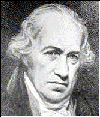
James Watt developed the steam engine.
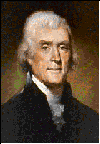
Thomas Jefferson was the author of the Declaration of American Independence.

John Hancock was the first signer of the Declaration of Independence.
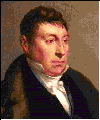
The marquis de Lafayette offered his services to the Continental Congress at Philadelphia.
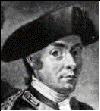
John Paul Jones was an American naval officer and hero.

Ludwig van Beethoven is known for his instrumental works, including symphonies, concertos, sonatas, and chamber music.

Marie Antoinette was the queen consort of King Louis XVI of France.
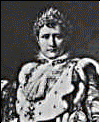
Napoleon Bonaparte was probably the most brilliant military figure in history.

Eli Whitney was the inventor of the cotton gin.

The Rosetta Stone eventually supplied the key to the decipherment of the Egyptian hieroglyphic script.
|

















